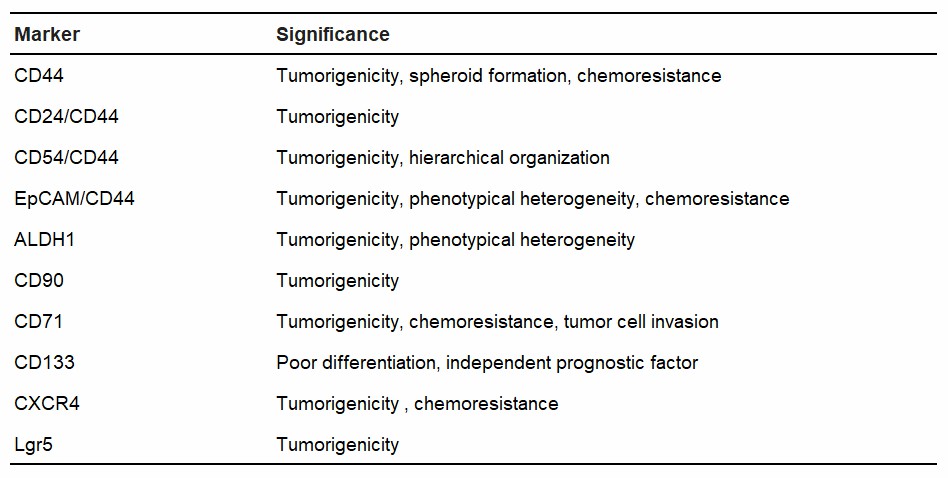Gastric Cancer Stem Cell Markers
Related Symbol Search List
Immunology Background
Overview of Gastric Cancer Stem Cell Markers
Gastric cancer stem cell markers are specific molecules or genes that are expressed in gastric cancer cells and are closely related to the presence and function of gastric cancer stem cells. Gastric cancer stem cells are a small group of gastric cancer cells with stem cell properties, which have the ability of self-renewal and multiple differentiation, and are considered to be the initiating cells of gastric cancer and are involved in the development, progression, and therapeutic resistance of gastric cancer. Therefore, the study of gastric cancer stem cell markers is of great significance for the in-depth understanding of the pathogenesis of gastric cancer, screening of new therapeutic targets, and improvement of therapeutic efficacy.
So far, many markers related to gastric cancer stem cells have been identified, including CD44, CD133, CD24, ALDH1, Lgr5, and so on (as shown in table 1). These markers can be used to identify the presence of gastric cancer stem cells and further investigate their biological properties and molecular mechanisms. Researchers have detected and analyzed markers in gastric cancer tissue samples as well as gastric cancer cell lines by using immunofluorescence staining, flow cytometry, single-cell sequencing, and other technological means. The continuous development and innovation of these research methods have provided strong support for the study of gastric cancer stem cell markers.
 Table.1 Gastric cancer stem cell markers. (Fu L, et al., 2020)
Table.1 Gastric cancer stem cell markers. (Fu L, et al., 2020)
Research Areas of Gastric Cancer Stem Cell Markers
Extensive research has been conducted on gastric cancer stem cell markers, spanning various aspects such as the pathogenesis, diagnosis, and prognosis of gastric cancer. Additionally, this thorough investigation encompasses the screening of therapeutic targets and the advancement of new drugs in the field.
- Firstly, in the study of the pathogenesis of gastric cancer, the discovery and identification of gastric cancer stem cell markers can help to reveal the characteristics and functions of gastric cancer-initiating cells, and then gain a deeper understanding of the molecular mechanism of gastric cancer development.
- Secondly, the detection of gastric cancer stem cell markers is of great significance in the diagnosis and prognosis evaluation of gastric cancer. By detecting the expression levels of the markers, it can assist in determining the grading and staging of tumors, guide the selection of treatment plans, and predict the survival and regression of patients.
- In addition, gastric cancer stem cell markers can also be used for the screening of targeted therapies. Through therapeutic strategies targeting markers, such as antibody drugs and small molecule inhibitors, researchers can interfere with the growth and proliferation of gastric cancer stem cells, thus improving the therapeutic effect.
- Finally, the study of gastric cancer stem cell markers also contributes to the development of new drugs. The development of specific inhibitors and targeted drugs against gastric cancer stem cell markers is expected to be a breakthrough in the field of gastric cancer treatment.
The study of gastric cancer stem cell markers plays an important role in the analysis of gastric cancer pathogenesis, diagnosis and prognosis, targeted therapies, and new drug development. Although facing some challenges, with the continuous progress of technology and the application of new methods, gastric cancer stem cell markers will play an increasingly important role in future research and are expected to provide more effective treatment options for gastric cancer patients.
Reference:
- Fu L, Bu L, Yasuda T, et al. Gastric cancer stem cells: current insights into the immune microenvironment and therapeutic targets[J]. Biomedicines, 2020, 8(1): 7.

